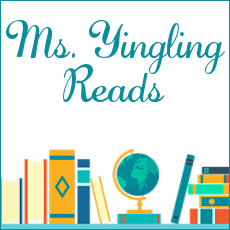 In 1955 West Germany, Peter is quite happy hanging out with his friends, helping to rebuild a church with his father, and trying to forget the atrocities of the war, which are all too fresh. When he finds letters of his mother's he begins to realize that his parents have kept something from him. He is not only adopted, but is a child that a Jewish woman thrust at his mother before she boarded a train to Dachau, where she faced certain death. While not technically a Holocaust book, this was a fascinating read that discusses how Jews still faced prejudice and obstacles after the war, and is a great depiction of a boy struggling with a difficult and new personal identity.
In 1955 West Germany, Peter is quite happy hanging out with his friends, helping to rebuild a church with his father, and trying to forget the atrocities of the war, which are all too fresh. When he finds letters of his mother's he begins to realize that his parents have kept something from him. He is not only adopted, but is a child that a Jewish woman thrust at his mother before she boarded a train to Dachau, where she faced certain death. While not technically a Holocaust book, this was a fascinating read that discusses how Jews still faced prejudice and obstacles after the war, and is a great depiction of a boy struggling with a difficult and new personal identity. I would swear I've read Kerry Cohen Hoffman's The Good Girl before. Struggling with her father's unemployment, her parents' divorce and the death of an older brother, Lindsey is tired of always doing the right thing. Her younger sister gets more attention for her misbehavior, and her parents won't discuss her brother. She turns to stealing, which makes her feel better temporarily, but which leads to huge complications in the end. The best part of this book is that there are caring adults in Lindsey's life-- she just chooses not to let them help her until the end. There is at least one gratuitous f-bomb, so be warned.
I would swear I've read Kerry Cohen Hoffman's The Good Girl before. Struggling with her father's unemployment, her parents' divorce and the death of an older brother, Lindsey is tired of always doing the right thing. Her younger sister gets more attention for her misbehavior, and her parents won't discuss her brother. She turns to stealing, which makes her feel better temporarily, but which leads to huge complications in the end. The best part of this book is that there are caring adults in Lindsey's life-- she just chooses not to let them help her until the end. There is at least one gratuitous f-bomb, so be warned.Looking at the descriptions of these, I should have know they were not suitable:

 Dishes by Rich Wallace: Nineteen-year-old Danny spends an eventful summer in Maine, looking for romance, working as a straight dishwasher in a gay bar, and trying to reconnect with his estranged father.
Dishes by Rich Wallace: Nineteen-year-old Danny spends an eventful summer in Maine, looking for romance, working as a straight dishwasher in a gay bar, and trying to reconnect with his estranged father.

 Dishes by Rich Wallace: Nineteen-year-old Danny spends an eventful summer in Maine, looking for romance, working as a straight dishwasher in a gay bar, and trying to reconnect with his estranged father.
Dishes by Rich Wallace: Nineteen-year-old Danny spends an eventful summer in Maine, looking for romance, working as a straight dishwasher in a gay bar, and trying to reconnect with his estranged father.Babylon Boyz by Jess Mowry: Inner-city teenagers find a suitcase full of cocaine and must decide whether to sell it and take the opportunities the money would provide or to destroy it to keep the drug from poisoning their community.
Both of these are fine stories. I like Wallace, and Mowry has a nice style. However, I would place these both at a high school level because of lots of mild expletives, casual drinking, and general name calling and other uncontrolled behavior. In short: I just don't want to hand these to my students as recommendations. For high school, they would be fine.
A note on weeding: I haven't weeded biographies for ten years, and since no one has used them recently, I thought it would be good to tighten the collection up. The winner: a 1992 biography of Michael Landon that had never been checked out. There were also some very dusty pre-1960s stories of Daniel Boone and some other generally odd and unused titles. A teacher complained about their removal, stating that "all the books in the library were starting to look the same". Yes. They are. Bright, new and APPEALING. As much as I might like to read moldy oldies, there are some of these that no child will ever touch. It's hard to do, and teachers complaining really doesn't help!































No comments:
Post a Comment